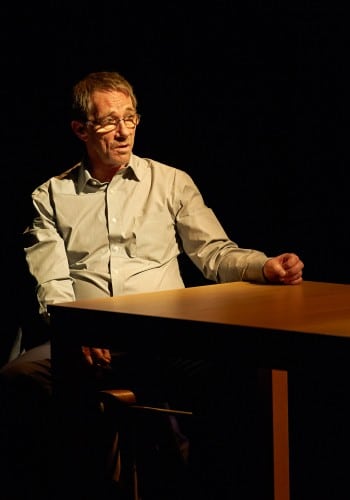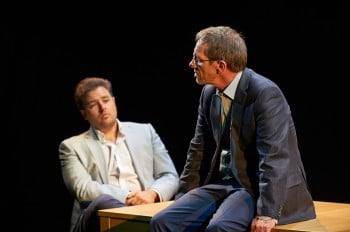A Number by Caryl Churchill – Perth Theatre Company

Human cloning. Father and son animosity. Nature vs. nurture. Grief. Murder. Deception.
Caryl Churchill explores all of these in A Number, but Perth Theatre Company (PTC) seems satisfied to let sleeping dogs lie in their current production of this work directed by PTC’s artistic director, Melissa Cantwell.
In a piece where controversial subjects meet with dramatic tension, sparks should fly. There should be electricity. Here, the electricity went into the lights and the speakers, rather than into the most essential elements: the warm bodies on stage.
PTC brought Kim Gyngell over to lend his talents to the production, headlining as the father (Salter) of the three clones we meet in this play, all played by Brent Hill. These two gentlemen seem up to the task of carrying off this two-hander and had they been pushed further into finding more intensity in their exchange, no doubt the chemistry between them could have emerged with some perceptibility from the start. However it wasn’t until the third clone appeared that things started to get interesting between the two men on stage, and by then it was too late.
Rather than going for a naturalistic conversational rhythm and pace, wherein people talk over each other, lose their train of thought, and abandon what they’re in the middle of saying, the actors waited patiently for their cues and ran right through moments where the script demands the actor rethink what he’s saying and start again. The conversation verges on stagnant, given what’s discussed (one clone’s mention of his intent to kill another clone, for example), and what’s at stake for these characters (finding out one’s true origins, understanding the real consequence of playing god).

Two of the clones are mostly indistinguishable from each other, aside from their costumes (Bruce McKinven) and their lighting (Jon Buswell). We can only assume that the director has chosen this deliberately, just as we should assume that she has chosen to dilute the show’s overall dramatic tension deliberately, in order to present a cold, unfeeling, lifeless atmosphere. Rather than opening up the dialogue to reveal its emotional core, she has shut emotion down in favor of using ominous music cues (Peter Dawson) to supplant the drama that should naturally be there as a result of two people struggling to get what they want from each other.
This short piece has the potential to really pack a punch and have an impact on its audience; the script is dense with possibility. Rather than sparking debate about the ideas Churchill presents, we are instead left to debate a number of missed opportunities in this production.

